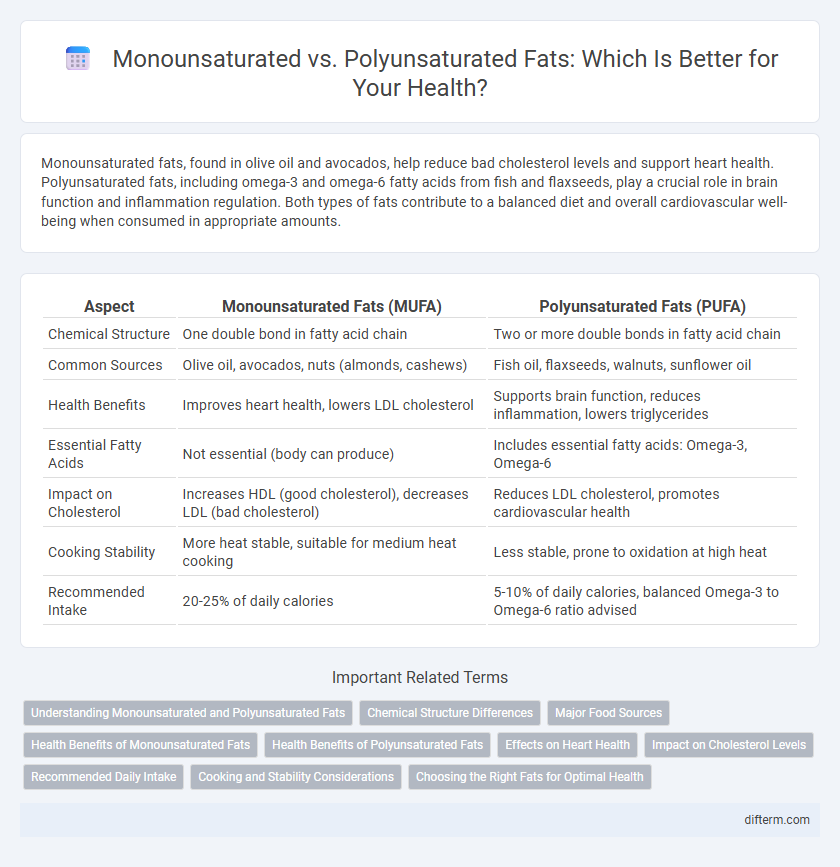Monounsaturated fats, found in olive oil and avocados, help reduce bad cholesterol levels and support heart health. Polyunsaturated fats, including omega-3 and omega-6 fatty acids from fish and flaxseeds, play a crucial role in brain function and inflammation regulation. Both types of fats contribute to a balanced diet and overall cardiovascular well-being when consumed in appropriate amounts.
Table of Comparison
| Aspect | Monounsaturated Fats (MUFA) | Polyunsaturated Fats (PUFA) |
|---|---|---|
| Chemical Structure | One double bond in fatty acid chain | Two or more double bonds in fatty acid chain |
| Common Sources | Olive oil, avocados, nuts (almonds, cashews) | Fish oil, flaxseeds, walnuts, sunflower oil |
| Health Benefits | Improves heart health, lowers LDL cholesterol | Supports brain function, reduces inflammation, lowers triglycerides |
| Essential Fatty Acids | Not essential (body can produce) | Includes essential fatty acids: Omega-3, Omega-6 |
| Impact on Cholesterol | Increases HDL (good cholesterol), decreases LDL (bad cholesterol) | Reduces LDL cholesterol, promotes cardiovascular health |
| Cooking Stability | More heat stable, suitable for medium heat cooking | Less stable, prone to oxidation at high heat |
| Recommended Intake | 20-25% of daily calories | 5-10% of daily calories, balanced Omega-3 to Omega-6 ratio advised |
Understanding Monounsaturated and Polyunsaturated Fats
Monounsaturated fats, found in olive oil, avocados, and nuts, help reduce bad cholesterol levels and lower the risk of heart disease. Polyunsaturated fats include omega-3 and omega-6 fatty acids, essential for brain function and cell growth, present in fatty fish, flaxseeds, and walnuts. Both types support cardiovascular health by improving lipid profiles and reducing inflammation when consumed in balanced amounts.
Chemical Structure Differences
Monounsaturated fats contain one double bond in their fatty acid chains, resulting in a single kink that impacts fluidity and stability. Polyunsaturated fats have multiple double bonds, creating several kinks that increase membrane fluidity and susceptibility to oxidation. These chemical structure differences influence their roles in cardiovascular health and cellular function.
Major Food Sources
Monounsaturated fats are primarily found in olive oil, avocados, and nuts such as almonds and cashews, which contribute to heart health by improving cholesterol levels. Polyunsaturated fats, including omega-3 and omega-6 fatty acids, are abundant in fatty fish like salmon and mackerel, as well as seeds such as flaxseeds and walnuts. Incorporating these sources supports cardiovascular function and reduces inflammation through essential fatty acids intake.
Health Benefits of Monounsaturated Fats
Monounsaturated fats, found in olive oil, avocados, and nuts, are linked to improved heart health by reducing LDL cholesterol levels while maintaining HDL cholesterol. These fats support insulin sensitivity, helping manage type 2 diabetes risk and blood sugar control. Rich in antioxidants, monounsaturated fats also combat inflammation and oxidative stress, promoting overall cellular health.
Health Benefits of Polyunsaturated Fats
Polyunsaturated fats, found in sources like fatty fish, walnuts, and flaxseeds, play a crucial role in reducing heart disease risk by lowering LDL cholesterol levels. Rich in essential omega-3 and omega-6 fatty acids, these fats support brain function, reduce inflammation, and promote healthy cell growth. Incorporating polyunsaturated fats into the diet has been linked to improved cardiovascular health and better regulation of blood pressure.
Effects on Heart Health
Monounsaturated fats, such as those found in olive oil and avocados, help reduce LDL cholesterol levels while maintaining HDL cholesterol, promoting better heart health. Polyunsaturated fats, including omega-3 fatty acids in fatty fish and omega-6 fatty acids in sunflower oil, improve blood vessel function and reduce inflammation, lowering the risk of cardiovascular disease. Both types of unsaturated fats contribute to decreased arterial plaque buildup and lower blood pressure, supporting overall cardiovascular health.
Impact on Cholesterol Levels
Monounsaturated fats, found in olive oil and avocados, effectively lower low-density lipoprotein (LDL) cholesterol while maintaining or increasing high-density lipoprotein (HDL) cholesterol, promoting heart health. Polyunsaturated fats, present in fatty fish, walnuts, and flaxseeds, also reduce LDL cholesterol but offer additional benefits by providing essential omega-3 and omega-6 fatty acids that reduce inflammation and improve overall cardiovascular function. Replacing saturated fats with monounsaturated or polyunsaturated fats significantly reduces the risk of coronary artery disease by improving lipid profiles and supporting arterial health.
Recommended Daily Intake
Recommended daily intake for monounsaturated fats is approximately 15-20% of total calories, supporting heart health and cholesterol balance. Polyunsaturated fats, including omega-3 and omega-6 fatty acids, should constitute 5-10% of daily calories to promote brain function and reduce inflammation. Balancing these fats within overall dietary fat intake of 25-35% of total calories optimizes cardiovascular and metabolic health.
Cooking and Stability Considerations
Monounsaturated fats, found in olive oil and avocado oil, offer medium heat stability ideal for sauteing and light frying due to their balanced smoke points around 375degF to 420degF. Polyunsaturated fats, abundant in flaxseed and soybean oils, have lower smoke points, typically between 320degF and 450degF, making them more prone to oxidation and less suitable for high-temperature cooking. Selecting oils with appropriate smoke points enhances cooking safety and preserves nutritional quality by minimizing harmful free radical formation.
Choosing the Right Fats for Optimal Health
Monounsaturated fats, found in olive oil, avocados, and nuts, help reduce bad LDL cholesterol while maintaining good HDL cholesterol, supporting heart health and inflammation control. Polyunsaturated fats, including omega-3 and omega-6 fatty acids from fatty fish, flaxseeds, and walnuts, are essential for brain function and reducing cardiovascular risk. Balancing monounsaturated and polyunsaturated fat intake, while minimizing saturated and trans fats, promotes optimal metabolic function and long-term disease prevention.
Monounsaturated vs Polyunsaturated Infographic

 difterm.com
difterm.com